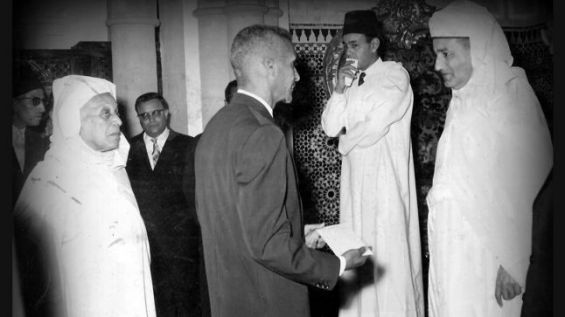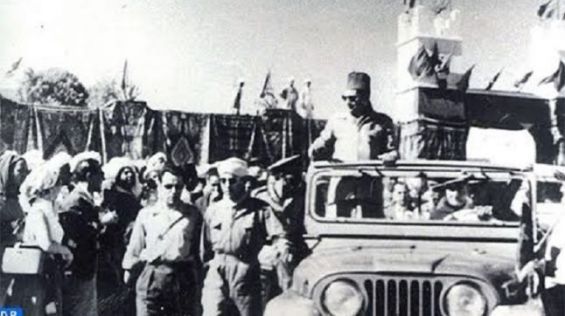Mauritanians celebrate every year the 28th of November, commemorating their independence. A special celebration that brings us back to a shared history, Moroccans have taken part to during the 60's. Indeed, declaring Mauritania an independent State in November the 28th 1960 was not a joyful announcement for everybody at the time. And as Mauritanians celebrated their independence, Moroccans witnessed their dream of building a «great Maghreb» collapse before their eyes.
Long before Mauritania was granted independence, in 1956 the Moroccan Kingdom had constantly claimed its sovereignty over the Saharan territories. Claims that have been accentuated right after independence, highlighting the history shared between Morocco and Mauritania. However, France was not ready to withdraw from North Africa, leaving a state extending from Tangier to the Senegal river. Mauritania has indeed been since then that other bone of contention between Morocco, newly proclaimed independent, and colonial France.

On the 25th of February 1958, only a few months after Morocco was granted independence, King Mohammed V visited M’Hamid El Ghizlane. «It was a historical and symbolic event for the Kingdom which was finally able to embrace independence, especially in the southern regions of the country», said Jilali El Adnani, a historian and professor at the Mohammed V university in Rabat, when asked by MAP news agency last February. «It was during this visit that the Sahrawi tribes including Teknas, Rguibats, Ouled Dlim, Laarossiyines and others had come to renew their allegiance and their attachment to their motherland», he added.
France «defending its own interests»
Although the King’s visit led to the recovery of Tarfaya on the 16th of April, 1958, the Kingdom was planning to seize back the rest of its Saharan provinces. These provinces included neighboring Mauritania, according to a reportage broadcasted by the French national TV at the time and released a few years later by the French National Audiovisual Institute (INA). «Produced in 1960, [the reportage] seems to have been produced by the French news agency but has never seen light. The reason probably lies in the thesis defended by the journalist, who explicitly takes the Moroccan side regarding the Mauritanian question», states an explanation that preceded the report. It also mentioned in particular that several Mauritanian personalities have visited Morocco to hold talks with King Mohammed V.
«The official visit of His Majesty Mohammed V to the south of the country is only one of the most recent aspects of the Moroccan sovereignty over Mauritania. This vast territory of a million square kilometers is populated by one million inhabitants. Anxious to defend its own interests, France urged after Morocco gained independence to found the Islamic Republic of Mauritania, detached from Moroccan sovereignty under the leadership of a pseudo-government.»
For INA, the reportage «highlighted the fact that Mauritanians were among Morocco’s highest authorities, (…) showed that they have opposed the ‘pseudo-government’ of Mokhtar Ould Daddah described as entirely controlled by France [and] seemed to be part of the press campaign initiated by the Kingdom to defend its claims over Mauritania».
Morocco divided into seven parts after the protectorate
Long before the independence of Mauritania, Allal El Fassi, the founding father of the Istiqlal party (Independence party) defended the idea of founding a «greater Morocco» in 1955. A territory extending from «Tangier to St. Louis River in Senegal».
This version of the story was supported by the account provided by Zamane. In an article published in 2014, the magazine specialized in history, shed light on Mauritania. It indicates that «the 28th of November was a day of mourning in Morocco». Zamane insisted that with the arrival of France and Spain, the Kingdom was divided into seven parts. «A French protectorate in the center, another Spanish one in the North, an international zone in Tangier, a Spanish colony in Oued Eddahab, another one in Saguia El Hamra, with the Spanish presence in Sebta and Melilla and finally a French colony in the southern region of the Kingdom extended to the Senegal River», adds the same source.
«When the French-Moroccan was signed in March 1956, it was normal from the Moroccan point of view to see these seven zones included in the historical and natural boundaries they represented before 1912. But that never happened. Morocco was granted independence through multiple stages, which resulted in losing parts of its land».
Morocco and Mauritania to turn the page by 1969
In a document dedicated to the independence of Mauritania, issued in June 2013, Al Massae gives its version of the story regarding this historical event, arguing that despite the opposition of King Hassan II, then Crown Prince, «King Mohammed V supported the idea of annexing Mauritania». A position that was based on «the historical relations that linked the Saharan tribal leaders to the Alaouite sultans».
Al Massae also reports that during these events, King Mohammed V hosted on the 28th of March the Emir of Trarza, Fal Ould Oumeir (appointed Minister of State in November 1960), Mohammed Ould Bah, Edday Ould Sidi Baba and other Mauritanian personalities «to discuss the terms and conditions for the recovery of Mauritania». A meeting that angered the French authorities at the time, according to the same source.
While opposing France, Morocco decided to pull the rug out from under France’s feet. «A real diplomatic counterattack throughout 1960» was launched, according to INA. Al Massae refers, meanwhile, to a «White Paper» from November the 4th 1960, in which Morocco «exposes the historical and legal foundations defending its claims».

On 28th of November from the same year, Mokhtar Ould Daddah declared the independence of his country. The following year, Nouakchott was recognized by the United Nations. An international recognition that Morocco kept refusing until 1969.
On the 22nd of September 1969, King Hassan II hosted for the first time the Mauritanian President Mokhtar Ould Daddah in Rabat, marking the end of a controversial chapter in the history of North Africa.





 chargement...
chargement...












